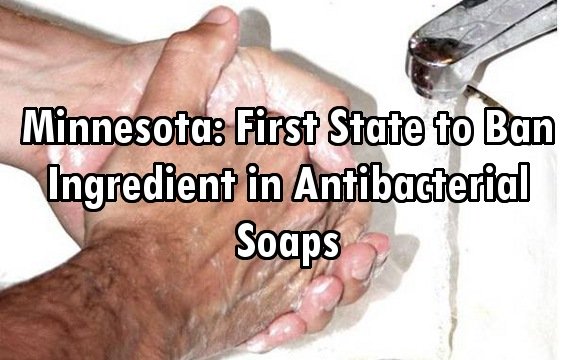Minnesota: First State to Ban Ingredient in Antibacterial Soaps

 Call it over-legislation if you want, but Minnesota state lawmakers took a step to protect their citizens from the potentially-harmful effects of triclosan. The chemical most often found in antibacterial soaps will no longer be allowed in consumer hygiene products effective Jan. 1, 2017.
Call it over-legislation if you want, but Minnesota state lawmakers took a step to protect their citizens from the potentially-harmful effects of triclosan. The chemical most often found in antibacterial soaps will no longer be allowed in consumer hygiene products effective Jan. 1, 2017.
Triclosan is found in about three-fourths of all antibacterial soaps and body washes in the US, reports The Huffington Post. It’s also found in cosmetics, dish soaps, and other cleaning products. The problem with triclosan is that while it might kill “germs,” it also disrupts hormone production.
The Food and Drug Administration announced last year that it would revisit the safety of triclosan. The organization says there is no research proving its harm on humans, but recognize testing on laboratory animals has revealed both endocrine disruption and a weakened defense against resistant bacteria.
Some manufacturers, including Procter & Gamble and Johnson & Johnson have already announced plans to phase triclosan out of their products. It’s believed the compound will be all-but eliminated from personal care products, possibly even before the Minnesota ban takes effect.
“While this is an effort to ban triclosan from one of the 50 states, I think it will have a greater impact than that,” said state senator John Marty, sponsor of the bill.
Research from Tufts University has shown that triclosan used on the skin is easily absorbed into the body. If we use it, it’s inside of us, and has even been found in three out of five human breast milk samples—meaning we are passing it on to the children.
A study from Beyond Pesticides says that animal research has found triclosan to alter thyroid hormone production and gene expression. Another found it’s estrogenic and androgenic properties could make it a potential contributor to breast cancer risk.
Also outlining triclosan dangers, researchers at the University of California, Davis published their study linking the popular chemical triclosan to muscle function impairments in humans, mice, and fish. Exposure could eventually contribute to heart disease and heart failure because of reduced contractions in cardiac and skeletal muscles—unsettling news given the chemical’s growing prevalence since the 1970s.
Marty may hope the momentum of his bill spreads, leading to similar bans in other states. But wouldn’t it be easier if the personal care industry just took responsibility for removing the questionable chemical from their products? Wouldn’t it be far easier for consumers to simply stop supporting the companies who use triclosan?
Until a ban is passed in your state, consider leaving products with triclosan on the shelf, and educate the people around you about the research.
